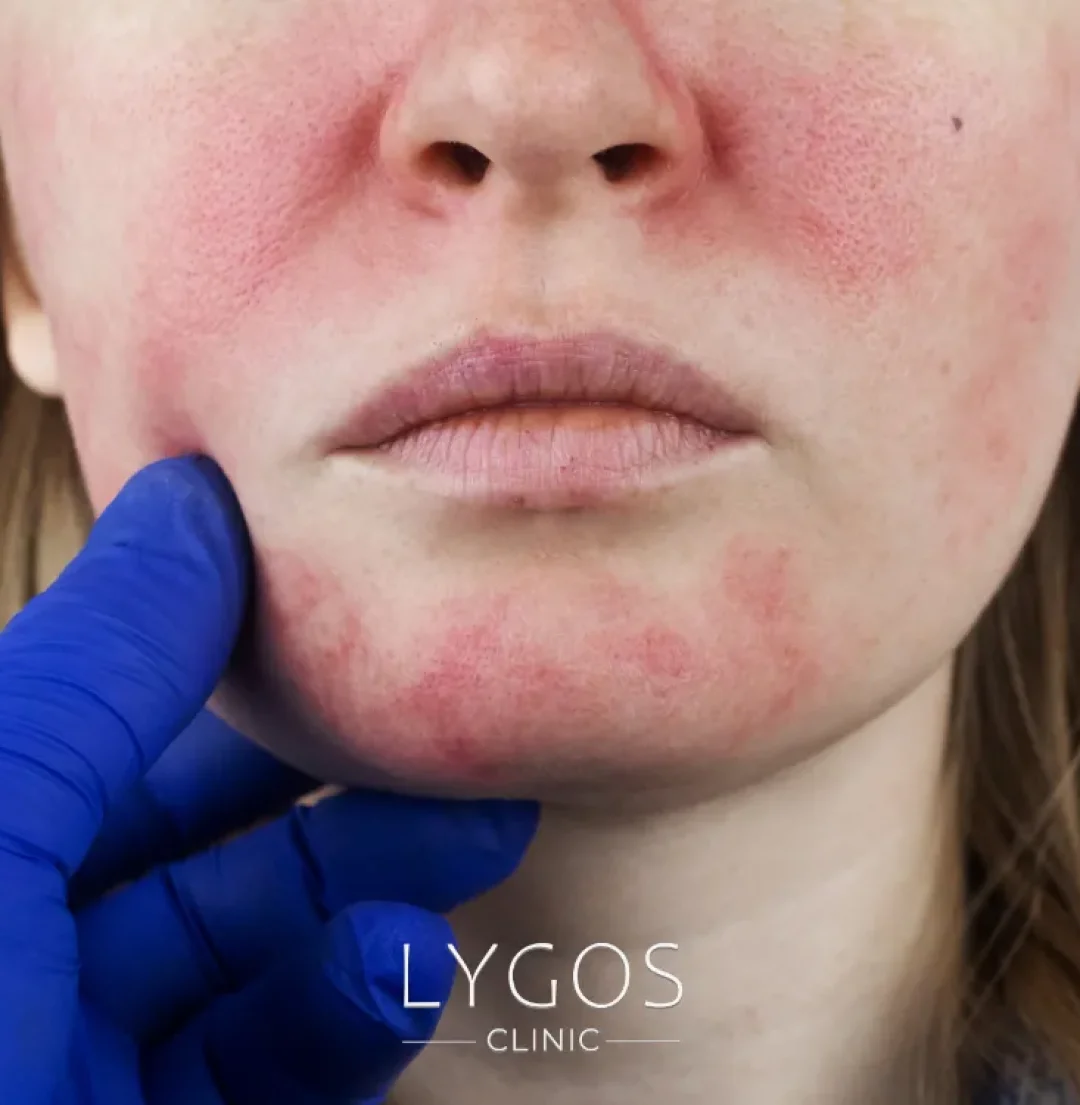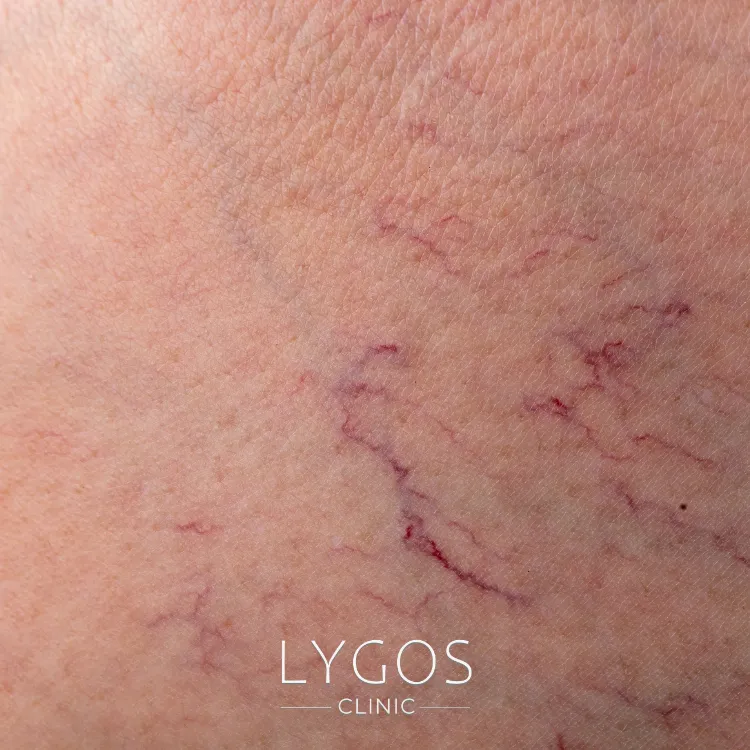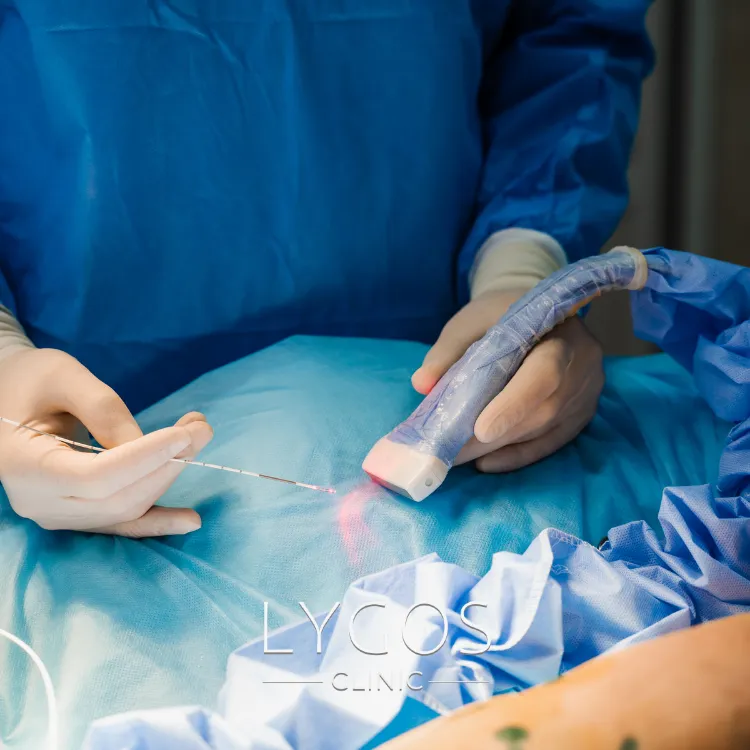Capillaries
Capillaries refer to the dilation and visible enlargement of thin blood vessels that appear as fine lines close to the skin’s surface. This common condition can occur on various parts of the body, although it is most frequently seen on the face and legs, especially in fair-skinned individuals. Capillaries can make the skin more sensitive and cause red spots and facial redness, potentially impacting both psychological well-being and social life.
Choose Your Topic
Get in Touch
Get professional treatments in Turkey at Lygos Clinic, offering effective, affordable treatments for a healthier and more aesthetically pleasing life.
You can contact us via WhatsApp and Instagram for a quick response.

Why Capillaries Occur on the Face?
The face is a particularly sensitive area and is prone to various internal and external factors. Common causes of capillary formation on the face include:
- Hormonal treatments or medications used after childbirth.
- Nasal surgery, which can lead to ruptured facial capillaries.
- Blood-related conditions such as lymphoma, multiple myeloma, and leukemia.
- Naturally thin and sensitive skin.
- Prolonged exposure to sunlight.
- Skin conditions like rosacea or acne rosacea.
- Use of certain skincare creams.
- Autoimmune diseases like lupus, radiation exposure, and other medical conditions.
- Aging and genetic predisposition.
How to Treat Capillaries on the Face?
Thanks to modern advancements, treating facial capillaries has become more efficient and effective. Laser and light-based treatments such as 4D Laser, KTP Laser, and IPL (Intense Pulsed Light) are among the most preferred options.
In laser therapy, targeted beams are applied directly to the affected vessels. This method must be performed with precision by an experienced doctor. The laser targets oxyhemoglobin in the blood, causing the treated vessels to gradually disappear due to heat-induced damage.
Interestingly, patients with thicker veins tend to heal faster, as these veins carry more blood and oxyhemoglobin. However, the success of the treatment also depends on factors like medication adherence and genetic characteristics.


Who is Capillary Treatment Suitable for?
Capillary treatment is suitable for every person who meets the necessary conditions. People who are not suitable for this treatment method are shown as follows:
- It is not recommended for a woman who is a mother-to-be to have capillary treatment during pregnancy.
- People with bleeding disorders in the body are likely to have problems with capillary treatment. Therefore, the veins should be carefully examined before treatment.
- A careful examination before capillary treatment is also recommended in conditions that may complicate the process, such as epilepsy.
- The doctor should decide whether patients with pacemakers are suitable for treatment.
Things to Consider in Capillary Treatment
A person who complies with the things to be considered in capillary treatment usually gets successful results. In particular, following the advice given by the doctor before the treatment plays a critical role.
The patient, who must specify the medications and foods consumed before the procedure, may need to avoid blood thinners and foods. This situation, which makes capillary treatment difficult, may also affect the postoperative period.
Extreme heat is also among the things to be considered in capillary treatment. This is an important detail that causes capillaries to expand. Also, skin cleansing should be done before the operation. It should not be forgotten that make-up and skin pollution can cause problems in operations.
Therefore, any cream and moisturizer other than the creams recommended by the doctor should not be applied. Permanent scars may appear on the skin of a person who does not pay attention to all these details. As a result, it is of great importance not to tire and clean the skin before treatment.
One of the most important things to be considered after capillary treatment is to protect the skin. Especially the skin should be protected against sun rays. If care is not taken after the operation, complications may occur. If a person wants to avoid permanent spots and scars on his/her skin, he/she should follow the advice given by his/her doctor.


Laser Capillary Treatment
Capillary treatment is performed with more than one method. However, modern methods such as laser are developed with today’s technology to get the most effective results.
Especially in cases where drugs and creams are insufficient, laser treatment can be applied to access the vessels under the skin. Although it may seem like a painful process, there is no pain in laser capillary treatment.
Since the size of the vessels is small, problems close to the skin need to be treated carefully. Therefore, laser capillary treatment should be performed by a specialist doctor. There are many options during treatment. Laser, radio frequency and sclerotepasia methods are among these options.
Correct application and a successful procedure are very important for the process to progress well. Apart from this situation that directly affects the post-procedure, intense sunlight can also cause the treatment to fail.
What to Do Before Capillary Treatment
In a person who does not pay attention to what needs to be done before capillary treatment, negative effects may occur during and after the procedure. This situation is more common especially in people who do not follow the recommendations given by the doctor.Therefore, what needs to be done before treatment should be applied carefully.
The use of medication is also among the things to be done before capillary treatment. Some medications may cause dilation of the veins due to the substances they contain. If a patient is taking medication, he/she should definitely inform his/her doctor before capillary treatment.
The same applies to the foods to be consumed. It is generally recommended by experts not to prefer blood thinners and foods before the operation. However, if a patient has to use medication, planning may need to be done accordingly.
Care should also be taken to clean the skin before capillary treatment. Using the creams recommended by the doctor before the procedure plays a very critical role. Therefore, you should follow the planning made by the experts for you and avoid applying any cream or moisturizer.
In addition, situations that may complicate the treatment such as make-up and skin pollution should be avoided. Otherwise, permanent scars may form on the skin. As a result, it will be easier for a person who correctly applies what needs to be done before capillary treatment to achieve the desired appearance after the operation.


What to Do After Capillary Treatment
One of the things to do after capillary treatment is to prevent complications. It may be necessary to cool the treated area with an ice pack or cold bandages after 1 to 2 days. Apart from this, you should stay away from extreme heat after the procedure and act more carefully. In particular; sunlight, heaters and ovens can be shown as direct heat sources.
Redness and scars may occur on the skin after the operation. This situation, which should not cause any concern, is a reaction of the body to the procedure. Redness and scars that heal quite quickly should not be perceived as a significant threat. After capillary treatment, a small scab or skin damage may appear near the skin surface. In case of any other complications, you can consult your doctor.
Swelling or tingling may occur after treatment. If these symptoms, which are extremely rare, occur, they should be reported to the doctor and a planned course of action should be taken. Apart from these problems, which are eliminated by the injection, minor bruising may also occur when removing small capillaries. As a result, a person who follows what needs to be done after capillary treatment recovers within a few days.
Before and After Capillary Treatment
You can understand the difference before and after capillary treatment by taking a photo, so you can realize how effective the result is. In addition, the elimination of the bad appearance on the skin provides a positive psychological effect as well as aesthetic concerns.
Capillary treatment, which is a very practical option, is applied to the skin surface and shows its effect in a short time. After the operation, which takes an average of 1 hour, the change is felt in just a few days. As a result, the change that occurs before and after capillary treatment plays an impressive role.


Capillary Treatment Costs
Capillary treatment costs are affected by more than one situation. If the patient’s need is to be solved with methods such as cream or medication, the cost is determined accordingly. However, if the skin needs to be treated and methods such as laser treatment are needed, costs may increase.
In addition, the hospital where the treatment will take place and the equipment of the doctor who will perform the procedure also directly affect the costs of capillary treatment. Since each patient’s needs are different, it is natural that the costs are different. Therefore, capillary treatment costs vary between 1000 TL and 3000 TL on average as a session fee.
Get in Touch
Get professional treatments in Turkey at Lygos Clinic, offering effective, affordable treatments for a healthier and more aesthetically pleasing life.
You can contact us via WhatsApp and Instagram for a quick response.
Frequently Asked Questions About Capillary
BLOG

Is Breathing Through the Mouth Harmful?
Chose Your Topic Is Breathing Through the Mouth Harmful? Breathing is one of the most fundamental needs of life. However,

Does Rice Water Make Hair Grow? | Benefits of Rice Water
Chose Your Topic Does Rice Water Make Hair Grow? Natural methods in hair care have become quite popular in recent

Breast Lump | Types: Benign, Malign and Causes | LYGOS 2025
Breast Lump While cancer stands out as one of the most common health problems today, early diagnosis rates are also






